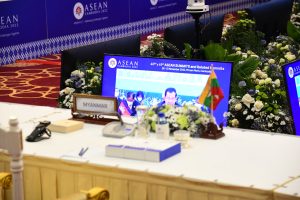“We should carve Myanmar out for now.”
Anwar Ibrahim made the eye-brow-raising comment at an ASEAN-themed event in Bangkok earlier this year. Malaysia’s prime minister said that Myanmar’s domestic turmoil was no longer an “internal matter” and that the conflict had spilled into neighboring countries. He reminded the audience that Malaysia alone had 200,000 refugees, most of whom were Rohingya Muslims.
No Southeast Asian country has made a bigger U-turn on Myanmar. Three decades ago, Malaysia was at the forefront of a campaign to bring the isolated nation into the Association of Southeast Asian Nations through a policy of “constructive engagement.” ASEAN dangled the “carrot” of membership, hoping to nudge Yangon to become “part of the family, part of the team.” But as Anwar indicated, ASEAN had hit a wall: “We have been engaging – we have engaged for the past 40 years. There’s a limit to what we can do.”
Mahathir Mohamad, Malaysia’s longest-serving prime minister, was the most vocal campaigner for Myanmar’s inclusion in the Southeast Asian bloc. Malaysia was chair of ASEAN in 1997, and Mahathir defended the autocratic regime in Yangon, saying Asia had “different concepts of democracy.” ASEAN’s newest addition, he declared, would “become a member first, then put their house in order.”
President Suharto of Indonesia shared Mahathir’s view. Both leaders recognized that the end of the Cold War presented a historic opportunity to fulfill the vision laid out by ASEAN’s founders. “With the 10 Southeast Asian countries together, we will form a community with a combined population of 500 million, bigger in fact than Europe or North America,” announced Mahathir that year.
Myanmar (formerly known as Burma) was a critical part of the strategic calculus. ASEAN’s founders did not want Southeast Asia to become a battleground for great power rivalry and viewed Burma as a potential “stalking horse” for China. Personal ambition played a role as well. Suharto and Mahathir wanted to leave a “completed” ASEAN as one of their legacies. Historian Robert Cribb of the Australian National University wrote that the momentum for Myanmar’s admission was “probably unstoppable.”
Despite its considerable baggage, resource-rich Myanmar had much to offer economically. In a conversation with Lee Jones, professor of international relations at the Queen Mary University of London, former diplomat Razali Ismail said one of ASEAN’s goals was to establish a commercial foothold in Myanmar “before the West, before the Chinese … and the Indians.” As Mahathir explained: “We may not be as rich, but the potential will be tremendous. We will be a significant player in Asia and the world.”
If Malaysia was the cheerleader, Indonesia was the “big brother.” Suharto’s doctrine of dwi fungsi (dual function), which envisioned a dual role for the armed forces in both military and political life, greatly appealed to the generals in Yangon. The Indonesian model became the blueprint for Myanmar and led to deeper ties between the two countries. Suharto’s relatives subsequently leveraged their political connections by establishing several family-owned businesses in Myanmar.
The United States and the European Union strongly opposed Myanmar’s status upgrade. The West felt membership in a prestigious pan-Asian organization was premature given the regime’s “woeful” human rights record. U.S. Secretary of State Madeleine Albright had been forthright in her criticism and warned: “Burma’s problems now become ASEAN’s problems.” However, some experts believe Western pressure was “not only ineffective but also counterproductive.” Even the Philippines’ President Fidel Ramos, whose country reportedly had reservations about admitting Myanmar, said ASEAN “cannot be bullied.”
Myanmar’s opposition leader, Aung San Suu Kyi, was skeptical of “constructive engagement.” She predicted the policy would fail: “To make Burma a member of ASEAN at this moment is to encourage (the regime) to be more repressive.” By 1999, ASEAN realized that its newest member had become a liability, an “embarrassing problem.”
For the generals, however, membership brought multiple benefits. “Rather than embarking on tightly controlled liberalization, the military used the revenue from ASEAN’s economic engagement, and the weapons supplied by Singaporean government-linked companies, to entrench itself in power, rejecting broader people-to-people relations,” wrote Lee Jones. Myanmar also forged close ties with China, a development Malaysia and Indonesia had hoped to forestall through ASEAN membership.
On a more poignant note, the two Muslim-majority countries, which lobbied hard for Myanmar’s inclusion in 1997, felt betrayed by the state persecution of Rohingyas. Two decades later, Mahathir urged Southeast Asia’s leaders to strip Myanmar of ASEAN membership for allowing “genocide” against its Muslim population.
Anwar’s comments were milder than his predecessor’s. But Malaysia seems ready to turn the page on the Myanmar saga.

































